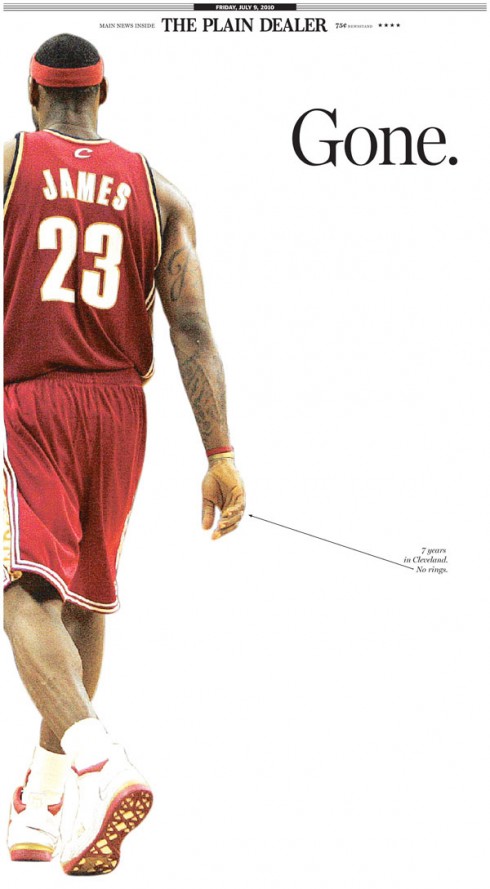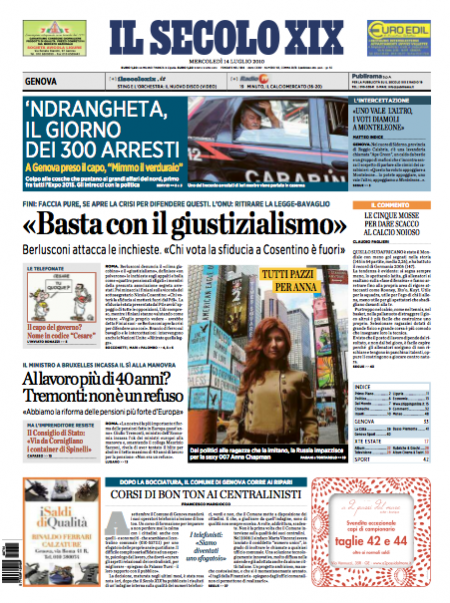Updated, Thursday, July 15, 08:00 EST
TAKEAWAY: Oh, the page one that surprises, stops you in your tracks and gives you that ephemeral lift! One such page appeared in the Cleveland Plain-Dealer recently, “lamenting” the departure of the city’s most renowned athlete, who left Cleveland for the sunnier climes of Miami. Here it is! We need more pages like it, and more editors who allow them to happen. PLUS; What happens when the police arrive in the newsroom asking for access to sources?
Minimalist yet fun and full of impact

In a nutshell: Basketball superstar LeBron James truly disappointed his Cleveland basketball fans Thursday evening going on live TV to announce that he was leaving to join the Miami Heat—-where he had some of his friends playing. Here the front page of the Plain Dealer showing James, walking out of the frame. A single word as the headline: “Gone.”
And below, a small block of text pointed to James’ finger: “7 years in Cleveland. No rings.” (that means he did not win championships for his Cleveland team!, in case he forgot).
I had seen this page already, but received several mails from readers who asked me to comment on this front page from the Cleveland Plain Dealer. I like it. I feel that it does what it is supposed to do in an excellent way, and, because it is not something one expects daily on a front page, it manages to surprise, to refresh, to make you want to read your newspaper again.
But, I urge you to read the excellent analysis of this page by colleague, Charles Apple, who dissected the page and its visual content:
http://www.poynter.org/column.asp?id=101&aid=186593
Stop the show: it is the police here!


Front page of Il Secolo XIX carrying the front page story (blue box top of page) that caused the police to come into newsroom; inside coverage of the story in today’s editions, below
I could say that it is all in a day’s work, but maybe not. In my 40 years visiting newsrooms, I had never been interrupted in the middle of a presentation by the arrival of the police looking for the editor.
It happened Wednesday in Genoa, Italy, in the newsroom of Il Secolo XIX, the area’s major daily newspaper.
We were just in the middle of a presentation to the publisher, editor and art director about the importance of tablets, with special emphasis on the iPad. The audience was in complete attention mode. Suddenly, a very agitated Il Secolo journalist opened the door, without knocking, and asked for the editor in chief to please come out. Commotion in the newsroom. Several police officers, in plainclothes, in view.
It is amazing how one can tell police officers from editors in a flash, or so I found out.
The journalists always look a little more disheveled in their appearance, not to mention that their faces reveal a sort of “I am smarter than you” attitude. The police, on the other hand, were better dressed, their faces saying something like “You guys may be smarter, but right now we have the upper hand here”.
The main police officer in charge of the “raid” of the Il Secolo newsroom wore a nice blazer, had a little designer stuble—-carabineri style——and sunglasses, even though it was not sunny inside the newsroom. As I mentioned to the publisher later at dinner, this police investigator was out of central casting, but more suitable for an episode of the old Miami Vice than for yesterday’s Genoa
Operation Ndrangheta, which is what had brought him to the Il Secolo newsroom.
Here is the story: The Italian police arrested more than 300 people, including local government officials, and seized millions of dollars in property, money, weapons and drugs across the country on Tuesday in one of the most extensive law enforcement operations against the crime syndicate known as ’Ndrangheta. It was front page news in every Italian newspaper, of course. However, Il Secolo XIX carried additional information that was more localized, and, allegedly, the reporters involved in the Il Secolo story published sensitive related facts that had to have been leaked by someone official, like a judge.
It is this suspicion that prompted another judge to authorize that police come to the newsroom seeking information, and asking reporters to reveal their sources. This is still a story in progress, but it was a new experience for me to see the police in action, interviewing journalists in the newsroom, and to see journalists gathered around their desks looking for papers and documents.
The police confiscated the computers of four Il Secolo XIX journalists linked to the story for allegedly “revealing secrets of an ongoing investigation”.
Although I was much surprised by the proceedings, it is obviously nothing new to the editors here. The editor in chief told me, rather non chalantly: “I have seen my share of police in the newsrooms in my 25 years as a journalist.”
For him, obviously, nothing strange, and, indeed, all in a day’s work.
Il Secolo XIX tells its own story about this incident in today’s editions (in Italian):
http://www.ilsecoloxix.it/p/genova/2010/07/14/AMzAg7rD-secolo_perquisiscono_redazione.shtml
And now: the iPad novel
It was to be expected, so I am not at all surprised. With the arrival of the iPad and other tablets, it was only a matter of time before authors decided to publish their books electronically only, with no print editions—-at least not at first. I can imagine that if a novel succeeds on a tablet, it is only natural that publishers will print the book for distribution through the more traditional ink on paper platform.
In Japan, novelist Ryu Murakami plans to release his latest novel exclusively for digital bookworms through Apple Inc.’s iPad ahead of the print version.
For the complete story:
http://blogs.wsj.com/japanrealtime/2010/07/15/ryu-murakami-skirts-publishers-with-ipad-novel/?mod=yahoo_hs
TheMarioBlog post #593